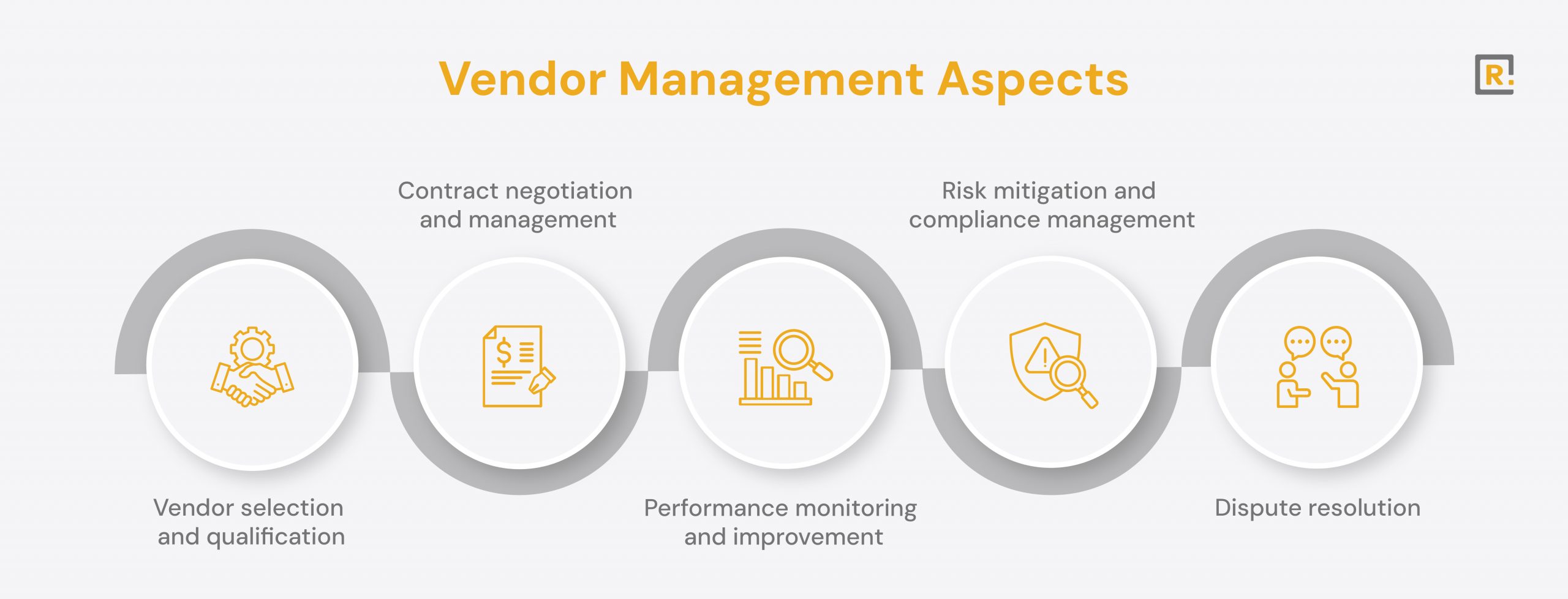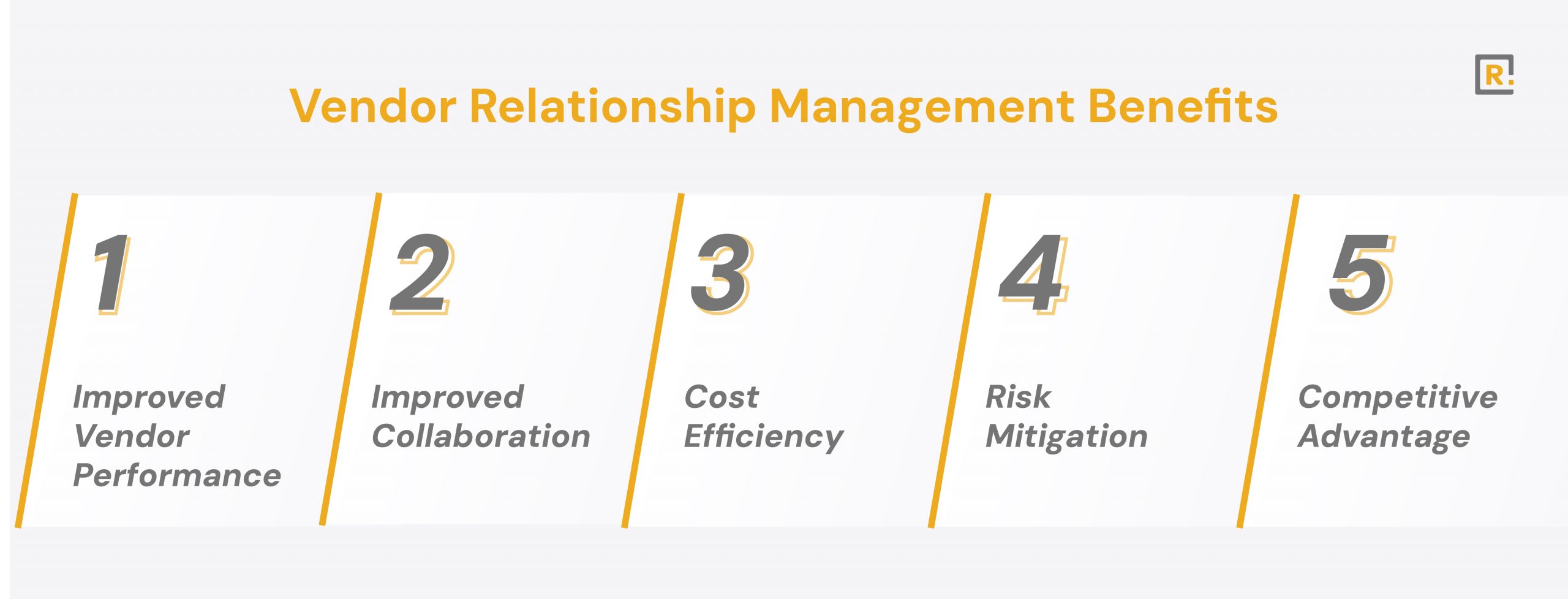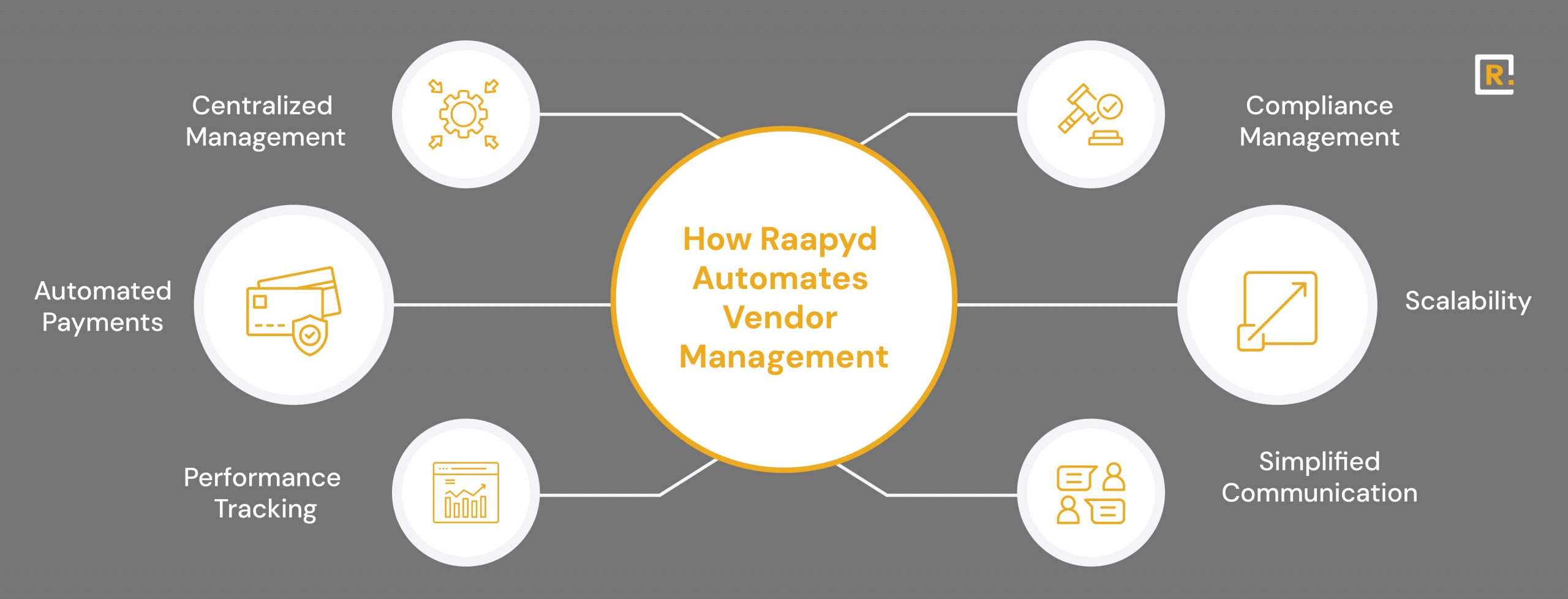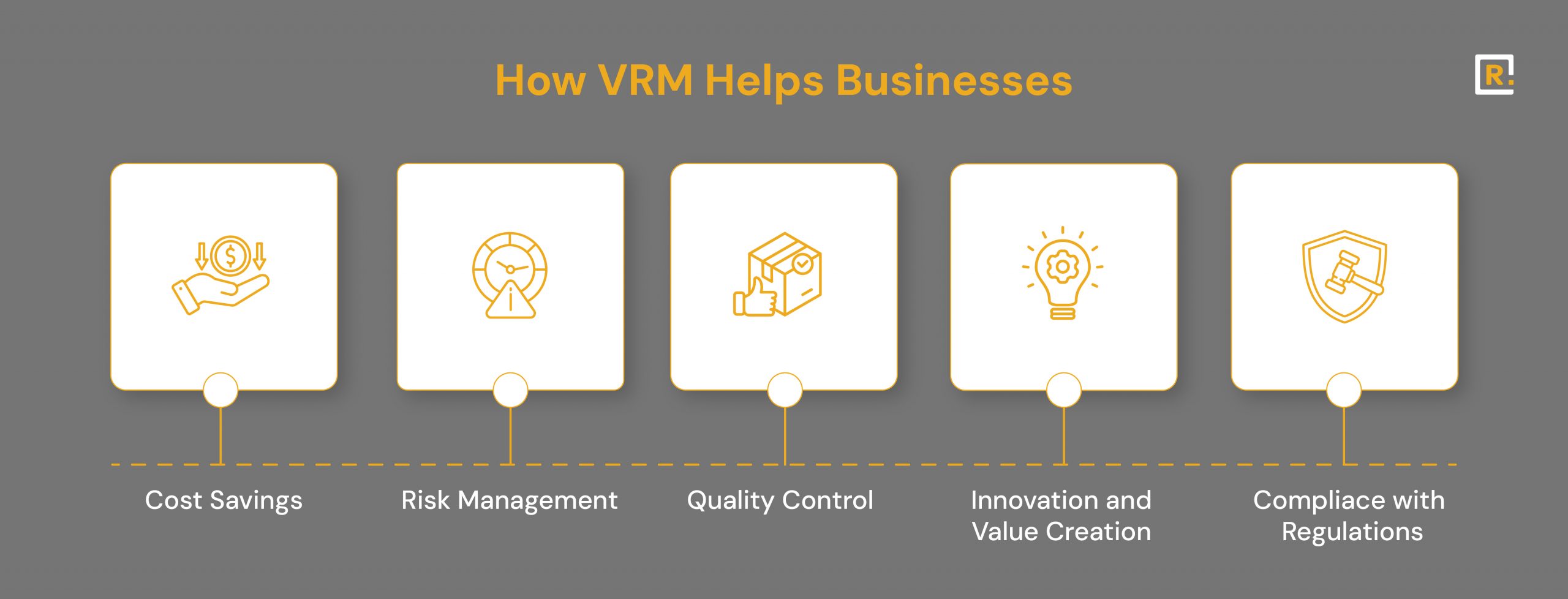-
Solutions
Vendor Management Efficient vendor management platformField Service Management Effective onsite service operationsReal Estate Management Efficient real estate managementAsset Management Efficient asset lifecycle managementDistribution Management System Optimized supply chain distributionDigital Retail Solution Integrated e-commerce solutionsSubscription and Billing System Automated billing and subscriptionsSales Force Automation Optimized sales process automationIntelligent Character Recognition Software Automated text conversion and data extraction
- Why Raapyd
- Insights
- About
Vendor Relationship Management: Best Practices in 2024
- Vendor Management

Vendor relationship management takes on strategic dimensions beyond an administrative function in today’s interconnected and agile global marketplace.
As much as companies have to change to meet the dynamics of globalization, accelerating technology, and shifting consumer expectations, how they manage these critical vendors can profoundly impact performance and long-term success.
Vendor ecosystems have expanded globally, spanning various regions and industries. As businesses diversify sourcing strategies to incorporate more technology and enter new markets, implementing a robust VRM system becomes increasingly important. Vendor relationship management can distinguish between being a market leader and being left behind.
So continue reading as we delve into the minute details of Vendor Relationship Management in this blog.
What is Vendor Relationship Management?
Vendor Relationship Management or VRM, refers to how organizations manage their interactions, performance, and contracts with vendors. Vendors are third-party entities that supply goods or services. However, VRM is more than just a record of suppliers; it is an approach toward attaining better value from vendors and reducing potential risks.
In other words, VRM ensures high productivity, win-win relationships, and goal-oriented relationships between a company and its external vendors. These could be vendors supplying raw materials, services, software, or even partners offering exceptional capabilities. Vendor management typically includes the following aspects:

- Vendor selection and qualification
- Contract negotiation and management
- Performance monitoring and improvement
- Risk mitigation and compliance management
- Dispute resolution
For modern organizations, VRM is about managing these aspects holistically. It involves strategic planning, including vendor selection, contract negotiation, operational oversight, performance tracking, and problem resolution.
Effective VRM aligns vendor relationships with broader business objectives; each vendor relationship must contribute to the organization’s success.
Why Do Organizations Need Vendor Relationship Management?
1. Cost Savings
An effective VRM can ensure significant cost savings for your business as it promotes better contract negotiation and performance. By managing vendor contracts and performance parameters effectively, companies can minimize overspending and find cost-reduction opportunities.
For example, an organization with a strong VRM can utilize vendor performance data to renegotiate a contract for discounts or other more favorable contractual terms. Strategic vendor management enables companies to cut hidden costs, such as delays caused by underperforming vendors or supply chains’ inefficiencies.
2. Risk Management
Every vendor has some kind of risk in operations. Such risks could be financial instability, poor performance, non-compliance, or cybersecurity vulnerabilities. Effective VRM allows organizations to discover these risks early and address them before they cause significant disruptions.
For example, suppose a vendor’s performance has started to deteriorate. In that case, good management tools will quickly identify this change so the company can take corrective actions before any great difficulties occur.
3. Quality Control
The quality of goods and services a business can offer relates to the quality of the inputs it procures from vendors. Whether it is raw materials, technology services, or customer support, the performance of vendors can affect the final products if it is not up to a certain level.
Controlling good relationships with vendors and monitoring their performance can ensure relatively good quality standards. This can satisfy many customers, increase business transactions, and create an even better reputation for the business.
4. Innovation and Value Creation
Vendors often offer more features over other third-party products or services. They can be potentially valuable sources of innovation. If vendors understand your business and its strategic goals, they can provide insights into the new products, emerging technologies, and process enhancements you are examining for best-fit requirements.
An organization with good, cooperative relationships developed with its vendors can leverage this as a source of potential. Vendors can be partnered with to co-innovate and create solutions that build competitive advantage through open communication and trust.
5. Compliance with Regulations
Industries like healthcare, finance, and manufacturing operate under tight government regulations. Complying with these regulations across the entire vendor network is challenging and essential. Effective VRM ensures all vendor interactions and deliverables align with industry standards and legal requirements.
For example, in business lines critical to data security and privacy, strong vendor management ensures that third-party suppliers strictly follow stringent data protection regulations and safeguards the company from potential legal and reputational losses.
Vendor vs. Supplier: Understanding the Difference
While “vendor” and “supplier” have been prevalent and can often be used interchangeably, these subtle differences can help businesses better outline their VRM strategies.
1. Vendor
A vendor provides products or services to an organization, often engaging in ongoing relationships and offering more than just physical goods. Vendors may be responsible for IT support, marketing, logistics, or consultancy services.
Their role is much more comprehensive; these companies aid the companies in improving operations or other problems besides delivering the products. Vendors often have increased responsibilities, such as customer support or technical assistance.
2. Supplier
A supplier usually supplies raw materials or components significant to the company’s production. Suppliers are more transactional and deal with the delivery of specific products. They typically don’t engage beyond their product delivery and are primarily concerned with fulfilling the agreed-upon orders.
For example, in the case of an auto industry firm, vendors may be IT service providers and logistic companies. At the same time, suppliers will include companies that provide steel, glass, and other materials needed to manufacture cars.
This distinction will also help one set clear expectations and manage the relationship differently depending on the nature of the vendor or supplier.
The Benefits of Vendor Relationship Management: What to Expect

1. Improved Vendor Performance
By monitoring performance regularly, a business can measure vendor output to its quality standards and service levels. Setting benchmarks and KPIs may also drive vendors to show enhanced performance with fewer delays, better quality, and more reliable service delivery.
2. Improved Collaboration
Strong VRM allows businesses and vendors to create a collaborative environment. This collaboration enables better problem-solving abilities and sharing ideas that might not appear under mere transactional relationships. It opens paths for co-innovation and strategic alignment by treating vendors as partners in unleashing potential rather than just another service provider.
3. Cost Efficiency
Regular audits of vendors regarding their performance and costs can expose some of these inefficiencies. In due time, companies learn that they are overpaying for services or products not correctly suited to the task. In practice, this can allow companies to change or renegotiate contracts, adjust orders, or eliminate underperforming vendors with substitutes that could be more cost-effective.
4. Risk Mitigation
It can mitigate risks, be they operational or reputational, by continuously evaluating vendors’ performance and health. Examples of the latter might be delayed deliveries (operational) or even non-compliance with standards of good conduct. Regular assessment ensures that vendors continue to meet the required business standards of safety, compliance, and quality.
5. Competitive Advantage
A well-managed vendor network is where the true competitive advantage lies. Vendors who understand what a company is about and what kind of difficulties it might encounter in the long run can provide unique services and solutions that are almost impossible to duplicate by its competitors. Such collaboration further translates into times to market, pricing models, and supply chains that are more responsive.
Vendor Relationship Management Strategies
For businesses aiming to maximize the value of their VRM efforts, here are some vendor relationship management best practices that can help your business:
1. Set Clear Goals
The outcomes that providers promise organizations must be clearly defined, covering measurable performance targets, firmly drawn-up SLAs, and expectations for quality, time, and partnership.
2. Create Detailed Contracts
These agreements should cover more than simple pricing. They should stipulate each party’s roles, performance metrics, dispute processes, and renewal or termination terms. This will ensure clarity on what is expected and a way to manage the relationship.
3. Monitor Vendor Performance with KPIs
Organizations should develop specific KPIs for performance tracking—delivery times, defect rate, responsiveness, or staying within the budget—through regular performance reviews. These initiatives ensure that they live up to their objectives and meet the standards in the contract outline.
4. Encourage Open Communication
The real key to maintaining a great vendor relationship is effective communication. Ring-fence time to have regular check-ins of their performance, challenges, and new opportunities to work together. On-the-spot issue resolution and provision of constructive feedback keep the relationship healthy and aligned.
5. Build Long-term, Strong Relationships
Suppliers are best viewed as strategic partners rather than simply as transacting suppliers in some business arrangements. Invest in a relationship where the vendors’ concerns are understood, and in return, you give insights into your business. This will be a work together in pursuit of mutual success.
6. Continuous Improvement
VRM is not something businesses should plan occasionally; it is an ongoing process. Continue evaluating your vendor management practices and finding what should change or be updated. This iterative process ensures that your VRM practices continue to grow as your business grows and expands.
7. Leverage Technology
Today, vendor relationships are complicated to manage without adequate technology. Specialized software can help smoothen various activities, from contract management to performance tracking, communication, and risk assessment.
How Raapyd Automates Vendor Management?
Raapyd automates the way organizations control their vendor relations. The platform leverages automation tools to enable firms to systematize and optimize the entire VRM cycle, from onboarding to performance management.
Here are some ways we help automate different aspects of your operations:

1. Centralized Management
Raapyd offers a single platform for consolidating all vendor-related details, such as contracts, communication history, and performance metrics. As such, it helps a business quickly and transparently manage its relationship with its vendors.
2. Automated Payments
Automated payment solutions provided by Raapyd ensure that transactions with vendors are conducted efficiently and minimize the manual nature of working, which postpones processes. This helps facilitate effective and timely payments that aid business-to-vendor relationship-building for enhanced collaboration.
3. Performance Tracking
Through Raapyd tools, vendor performance can be closely monitored in real time. Businesses can set KPIs, track vendor compliance, and receive automated alerts whenever performance drops below the agreed standards.
4. Compliance Management
The platform incorporates a module to manage vendor compliance against industry regulations, thus saving businesses legal hassles caused by vendors’ non-compliance in maintaining standards set for data protection, labor laws, and environmental policies.
5. Simplified Communication
Raapyd’s system-integrated communication tools enable establishments to have routine communications and transparent dialogue with vendors to reduce misunderstandings and foster collaboration in resolving issues before they aggravate them.
6. Scalability
Vendor ecosystems expand as a business grows, adding a growing level of complexity to the VRM process. Raapyd’s solutions scale with the business, meaning vendor management will remain as effective and efficient as the company grows.
Raapyd in the Future of VRM
Vendor relationship management (VRM) is central to business success in the future. In most cases, proper VRM strategies in organizations are the key to better performance, cost reduction, risk control, and innovation. Considering vendors as strategic partners and increasing collaboration helps gain the upper hand.
Leveraging tools like Raapyd’s automated solutions can increase the efficiency and effectiveness of VRM efforts. For companies, this simplifies vendor management since communication with vendors, payments to them, and compliance procedures are conducted with the help of Raapyd—all while scaling operations.
In this respect, it would be pertinent for a business to be clued into the trends and best practices in VRM so that its vendor relationships become an asset for future and long-term gain.
Discover More
Elevate Your Vendor Management with Raapyd
Unlock the power of Raapyd’s automated platform to scale your vendor relationships and stay ahead in the market.

